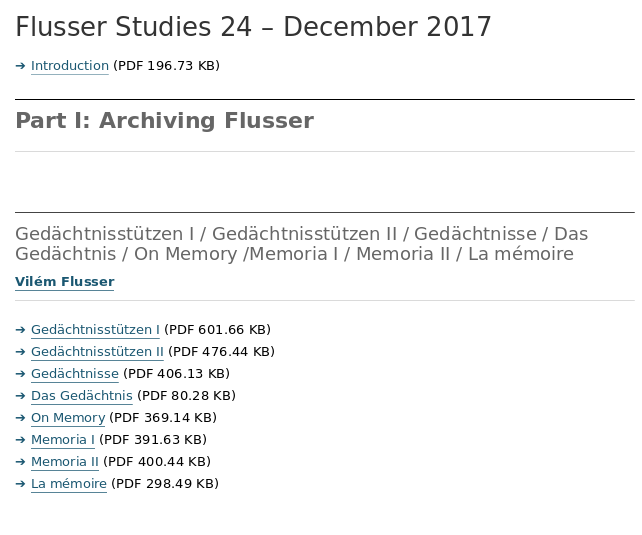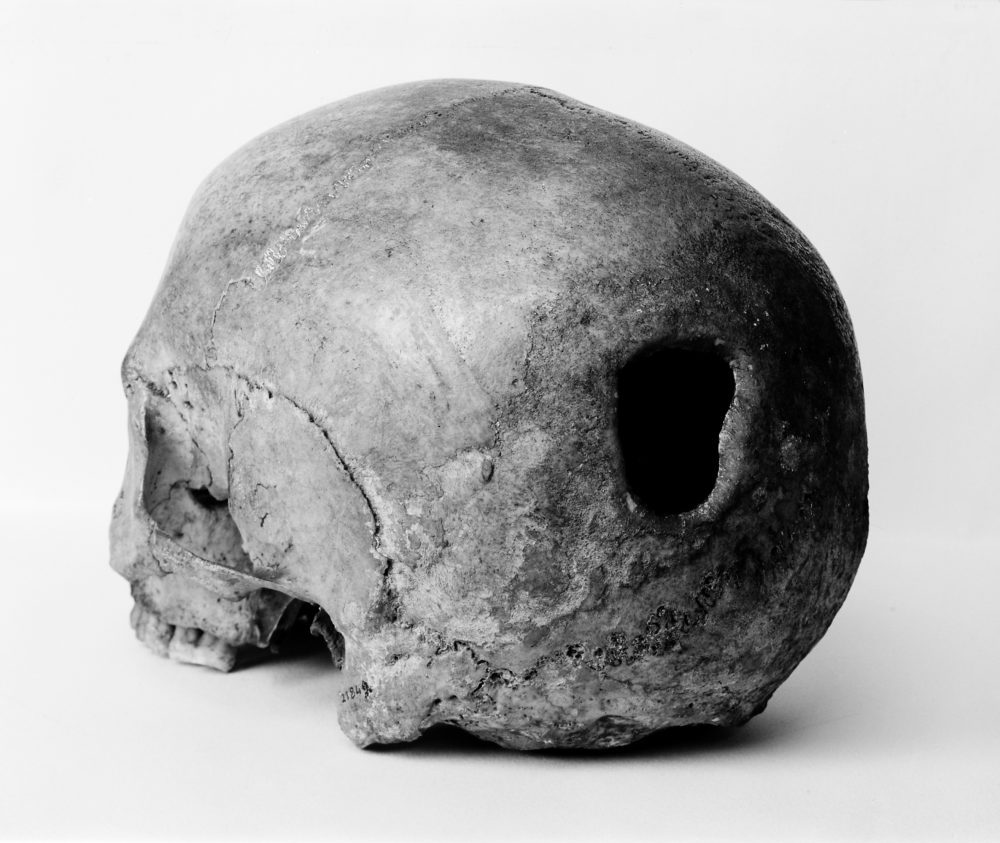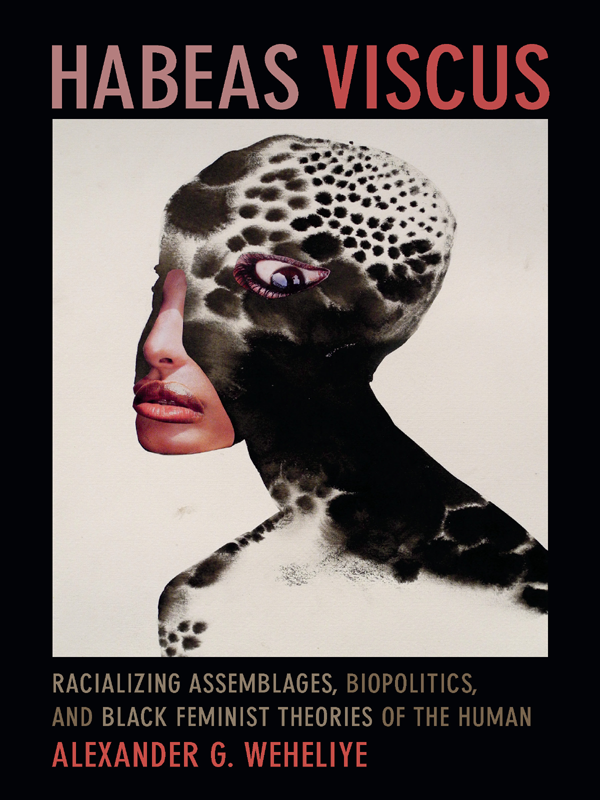Flusser Studies, 24: Archiving Flusser (2017) [DE, EN]
Filed under journal | Tags: · archive, media, theory

“Archiving the work of an artist or thinker is an activity that strongly defines and structures our view of her/him. Archives allot a specific place for each selected item and at the same time construct possible paths between them. This implies highlighting some areas while hiding others. In this sense, an archive is always also a metaphor for the work of an author. Traditional archives operate with hierarchical structures like the alphabet, which automatically define s a beginning and an end. Information technology, however, has opened a completely new array of possibilities. This issue of Flusser Studies reflects upon these theoretical and epistemological implications by presenting the different ways that Vilém Flusser’s work has been archived over the last 25 years.” (from Introduction)
With contributions by Vilém Flusser on memory, Bernd Wingert on Flusser Hypertext, Vera Schwamborn on MaHiPo, Klaus Sander and Daniel Irrgang on Flusser-Quellen, Claudia Klinger on Die Flusser-Files, Anita Jóri and Alexander Schindler on the Vilém Flusser Archive, Gerardo Santana Trujillo on MagmaMater, Gustavo Bernardo Krause on FlusserBrasil, and Simone Osthoff on her research on the archive.
Edited by Steffi Winkler and Rainer Guldin
Published December 2017
ISSN 1661-5719
Glass Bead, 2: Site 1: Logic Gate, the Politics of the Artifactual Mind (2017) [English/French]
Filed under journal | Tags: · abstraction, artificial intelligence, inhuman, logic, machine, mind, theory

“The first issue of the journal was dedicated to repositioning art in the landscape of reason. This issue is focused on the fabric of reason itself, and the ways in which it is currently altered by the emergence of artificial intelligence.
While the capacities of thought are being externalized in machines that increasingly mirror human intelligence, the question of the technical artifactuality of mind and its political ramifications becomes particularly pressing.
For us, far from being limited to the computational instantiation of intelligence, understanding the politics of these developments in artificial intelligence requires acknowledging that mind has always been artifactual.
Site 1: Logic Gate, the Politics of the Artifactual Mind proposes to explore the formal, philosophical and scientific dimensions of this question, so as to consider the role art might play in the lucid unfolding of its possibilities.”
With contributions by Danielle Macbeth, Gary Tomlinson, Matt Hare, Ben Woodard, Nina Power, Matteo Pasquinelli, Benjamin Bratton, Nora Khan, Hito Steyerl, Ian Cheng, Catarina Dutilh Novaes, Reviel Netz, Peli Grietzer, Lee Gamble, Dhanveer Singh Brar, T’ai Smith, and James Trafford.
Edited by Fabien Giraud, Jeremy Lecomte, Vincent Normand, Ida Soulard, and Inigo Wilkins
Publisher Glass Bead, November 2017
HTML, PDFs (English)
HTML, PDFs (French)
See also Issue 1
Alexander G. Weheliye: Habeas Viscus: Racializing Assemblages, Biopolitics, and Black Feminist Theories of the Human (2014)
Filed under book | Tags: · assemblage, bare life, biopolitics, black people, feminism, freedom, human, property, race, racialization, racism, slavery, theory

“Habeas Viscus focuses attention on the centrality of race to notions of the human. Alexander G. Weheliye develops a theory of ‘racializing assemblages,’ taking race as a set of sociopolitical processes that discipline humanity into full humans, not-quite-humans, and nonhumans. This disciplining, while not biological per se, frequently depends on anchoring political hierarchies in human flesh. The work of the black feminist scholars Hortense Spillers and Sylvia Wynter is vital to Weheliye’s argument. Particularly significant are their contributions to the intellectual project of black studies vis-à-vis racialization and the category of the human in western modernity. Wynter and Spillers configure black studies as an endeavor to disrupt the governing conception of humanity as synonymous with white, western man. Weheliye posits black feminist theories of modern humanity as useful correctives to the ‘bare life and biopolitics discourse’ exemplified by the works of Giorgio Agamben and Michel Foucault, which, Weheliye contends, vastly underestimate the conceptual and political significance of race in constructions of the human. Habeas Viscus reveals the pressing need to make the insights of black studies and black feminism foundational to the study of modern humanity.”
Publisher Duke University Press, Durham, 2014
ISBN 9780822356912, 0822356910
x+209 pages
Reviews: Ashon Crawley (LARB, 2015), Marianna Szczygielska (Parallax, 2015), Aditi Surie von Czechowski (Comp Stud South Asia, Africa and Middle East, 2015), Marianela Munoz and Charles Holm (Afro-Paradise, 2015), Megan H. Glick (Hypatia Rev, 2015), Shelleen Greene (Somatechnics, 2016), Amber Jamilla Musser (philoSOPHIA, 2016), Gabriela Radulescu (Allegra Lab, 2016), Ander Mendiguren Nebreda (Athenea Digital, 2017, ES).
Comment (0)
